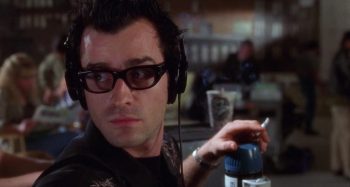David Lynch’s 2001 psychological thriller is a jarring depiction of the human being’s relationship with identity. The lack of it, the want for it, and the desire to attain it.
The story follows Betty (Naomi Watts), a young woman who moves to Hollywood to make a career for herself as an actress. While settling into her aunt Ruth’s apartment, which she is tasked with looking after, she is surprised to find an unknown woman (Laura Harring) showering in the apartment.
Betty befriends the woman, assuming her to have some type of relationship with her aunt Ruth. When asked, the woman tells Betty that her name is Rita and that she was showering because she had recently been in a car accident.
The two seem to develop a bond with one another, up until the moment Betty finds out that her aunt Ruth does not know any woman by the name of Rita. Betty soon discovers that Rita is suffering from amnesia from the car accident she said that she had been in and that, in fact, Rita is not her name. Rita does not remember anything about who she is- or was- leaving Betty with the job of trying to help her remember who she is, (or was).
Alongside this runs another story involving Adam Kesher (Justin Theroux), a director the audience follows as he scrambles to film his movie. Adam is indignant at the fact that the Hollywood higher-ups have demanded that he cast an actress they have decided
should star in his film.

Adam refuses to cast her, which leads to some damaging consequences. He goes home to find that his wife is having an affair with another man (Billy-Ray Cyrus) and that his bank account has been frozen. He is told to comply…or else.
Mulholland Drive presents itself as a brief show of life in Hollywood, but as is always the case with David Lynch, nothing is ever as simple as it appears. The film- on closer inspection- dives deep into the themes of identity and what it appears to be for the three characters concerned.
On one side, you have Betty and Rita; the former is intent on creating an identity through the movie industry’s bright lights, and the latter desperately trying to re-discover who she was. On the other hand, you have Adam, who is being threatened with having his identity taken away from him if he does not adhere to the rules laid out by the powerful men in suits.
Betty and Rita are not characters rather, they exist within the story to become characters, Betty wanting to become a successful actress, and Rita wanting to find out who she was before the car accident. What they discover ironically is nothing like the picture-perfect happily-ever-after that Hollywood films churn out but something more akin to a Greek tragedy, where their search for identity- specifically Rita’s- leaves them even more perplexed about who they are.
The scene that encapsulates this is when Betty and Rita go to a concert; they sit down and listen to Rebekah Del Rio sing ‘Llorando’, Spanish for ‘Crying’, and as the song goes on, the passion and energy of Del Rio’s voice stirs something up deep within Rita and Betty that causes them to weep (even causing Betty’s body to shake uncontrollably), at what, one cannot be sure.
Maybe the majesty of Del Rio’s voice caused the reaction, or perhaps that inexplicable feeling deep within one’s being was brought to the forefront, that feeling that causes a person to question who they are, where they came from, and where they are going.

The film plays with the concept of time and our understanding of linear storytelling towards the end of the story, when, approaching the climax, David Lynch- in typical fashion- swerves the audience with a twist that leaves them in awe of the actual reality behind the relationship that exists between Betty, Rita, and Adam.
The ending of Mulholland Drive has the Lynchian stamp all over it, leaving the viewer mystified, shocked, and constantly questioning the nature of human existence. Mulholland Drive takes what human beings have been using since the dawn of time- that being our identities- and shows us just how easily they are subject to the twists and turns of fate.

